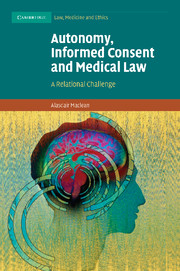Book contents
- Frontmatter
- Contents
- Table of cases
- List of figures
- Acknowledgements
- Introduction
- Part I An ethical model
- Part II Consent and the law
- 5 The legal regulation of consent
- 6 Rationalising the law and ethics of consent
- 7 Constructing consent: Future regulation and the practice of healthcare
- Summary and conclusion
- Bibliography
- Index
6 - Rationalising the law and ethics of consent
Published online by Cambridge University Press: 02 July 2009
- Frontmatter
- Contents
- Table of cases
- List of figures
- Acknowledgements
- Introduction
- Part I An ethical model
- Part II Consent and the law
- 5 The legal regulation of consent
- 6 Rationalising the law and ethics of consent
- 7 Constructing consent: Future regulation and the practice of healthcare
- Summary and conclusion
- Bibliography
- Index
Summary
In this chapter I compare the current legal regulation of consent against the model developed in Part I and I argue that the current regulation of consent falls short. However, this is not to suggest that the shortfall must be met by direct legal regulation. There are a number of alternative responses, which include allowing further development of the common law, legislation with or without a code of practice and a regulatory body, an enhanced role for professional regulation or some combination of these. Ultimately the decision is a political one that will be guided by the cost, the support of the various lobbies and the vision of the type of healthcare system that the government wants to develop; a market approach to healthcare supports a very different regulatory model of consent than more social, welfare or communitarian visions.
The model I have developed is a socio-liberal one in which respect for individual autonomy is seen as the guiding principle but that autonomy is situated in the professional–patient relationship and the wider network of relationships that constitutes the community. This allowed me to argue for a model of relational consent that incorporates both consent as a permission and consent as agreement. It also justifies a clear distinction between harm caused by an infringement of the right to consent and the harm caused by the materialisation of a risk.
- Type
- Chapter
- Information
- Autonomy, Informed Consent and Medical LawA Relational Challenge, pp. 191 - 219Publisher: Cambridge University PressPrint publication year: 2009



